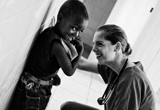 Monday marked my first full day of clinical work at the Ola During Children’s Hospital. I spent the day in the outpatient department talking to parents, examining children, making an initial diagnosis, and starting treatments. It was a delight to be able to care for children again.
Monday marked my first full day of clinical work at the Ola During Children’s Hospital. I spent the day in the outpatient department talking to parents, examining children, making an initial diagnosis, and starting treatments. It was a delight to be able to care for children again.
It has been difficult to combine my management/coordinating role with a clinical one. I love my job and definitely see the importance of what I am doing and the need to make sure that hospital systems/infrastructure/equipment are in place, but I often miss actually treating patients. Occasionally there are days during which I can spend a few hours doing clinical work, but it’s more of an exception than a rule.
A few months ago I was able to spend part of a week in our intensive care unit, which was difficult and intriguing. The patients were quite ill or had conditions that we could not diagnose and/or treat effectively due to limited resources, which was a challenge. At times we did not have enough oxygen to provide children with breathing difficulties with the oxygen support they needed. As you can imagine, this was a source of frustration however, it also reminded me of why Welbodi’s supportive role is so important. My experience in our “intensive care” unit was good, but I realized it is unfair to combine ICU work with non-clinical work. Those patients really need a doctor in there all the time. My plan was to see if the outpatient department was a better fit. It took me a while to get there, but after spending Monday there, I can say it is a much better fit.
I saw children with hydrocephalus, diarrheal disease with dehydration, severe anemia, pneumonia, malnutrition, probably tuberculosis, malaria, and cleft lip and palate. It was interesting to see such a variety of conditions, much like when I used to work in the Aberdeen clinic. I have to say though, compared to my previous job, the children at the Children’s Hospital are sicker with a high percentage needing admission. Admissions is something I missed in Aberdeen—it was tough at times having to refer the really sick children and losing sight of them once they were sent off. Now, I can admit them directly to the wards and even visit them at the end of clinic. This is definitely a bonus. It means I can chase up results, optimise their treatment plan, and arrange for ultrasounds. Of course some of this “chasing” can take time seeing as we have some glitches in our systems. Speaking of time, admissions are also more time consuming and so I end up seeing fewer patients a day compared to in Aberdeen. I didn’t realise it takes a fair amount of time to fill out the paperwork for admissions: history, examination, impression, treatment plan, treatment sheet, lab forms, prescription form, etc. However, it is worth it because I do like being able to admit patients.
Having spent some time away from clinical work it’s once again a bit of a learning process, but that’s okay, in the world of medicine we are continuously learning anyway. It’s a matter of reading up on specific diseases and treatment options as well as refining how to work as a doctor in a poor resource setting with limited diagnostic and treatment options. I have to continuously challenge myself to think outside the box a bit because it could be easy to give everyone a blanket treatment. You could potentially give every child an antimalarial and antibiotics and on average they would do fine. However, you would miss the more obscure illnesses and be over-treating a number of patients too. I want to stay sharp and give each of these children the best treatment possible with the resources available to me. I’m hoping to learn so much more in the near future and become better at something I am passionate about. For now, I’ll probably have to stick to one day a week in outpatients but it’s a start.
Sandra Lako is a doctor from the Netherlands who previously spent four and a half years in Sierra Leone setting up and managing a paediatric outpatient clinic with an organisation called Mercy Ships. After a year at home, she returned to Sierra Leone to volunteer as medical coordinator with the Welbodi Partnership, a UK based charity supporting the only government-run children’s hospital in a country where one in five children do not reach the age of 5.
